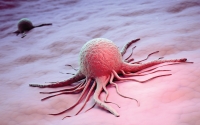On the Way to the Natural Control of Colon Cancer
About 140,000 people will receive a terrifying diagnosis in 20141: “You have colon cancer.” Colon cancer, known as colorectal or bowel cancer is the third most common cancer and the third leading cause of cancer related deaths in the US. Worldwide it is responsible for over 600,000 deaths. The annual cost of cancer care for a patient with metastatic cancer can reach $310,000, financially devastating a person and the family.
Colon cancer detected at its early stage (stage I) is usually removed by surgery. However, it is known that these cancer cells can spread quickly to vital organs in the body such as the lungs, liver, bones, etc. Conventional treatments, including chemotherapy and radiotherapy do not provide a cure and are associated with severe side effects ranging from nausea, diarrhea, neuropathy, bowel and bladder incontinence, life threatening infections, bleeding, bone marrow damage, and other cancers. The main reason for these severe side effects is that these approaches severely damage both healthy and cancer cells thereby impairing the body’s ability to successfully fight cancer and cope with the toxic treatments. Moreover, once the cancer has metastasized there are no effective solutions to fight it.
Multiple risk factors have been attributed to developing colon cancer such as a diet rich in red and processed meat, obesity, alcohol, smoking, inflammatory bowel disease, and an inherited predisposition. However, it is known that long-term deficiency of common micronutrients (i.e., folic acid, vitamin C, B-vitamins, and zinc) can damage cellular DNA by a mechanism similar to radiation and chemicals. This cancer risk factor appears significantly more important than any of the others, and it is the most easy and economical to correct.
While many individual micronutrients such as vitamin C, green tea and others have been studied for their anti-cancer properties, our research has shown that a combination of specific micronutrients working in synergy can be more effective by concurrently targeting multiple cancer mechanisms. We documented in multiple studies that vitamin C, lysine, proline, green tea extract, and other important components combined in synergistic proportions can be effective in halting metastasis (the spread of cancer cells), decreasing tumor growth and eliminating cancer cells without hurting healthy cells.
The efficacy of this micronutrient mixture was tested in colon cancer using both in vitro and in vivo approaches. We documented that these micronutrients could completely stop the spread of colon cancer cells (invasion was inhibited by 100%). The supplementation of diet of mice with this nutrient mixture resulted in significant inhibition of cancer progression. The mice developed smaller tumors (63% smaller) with fewer blood vessels compared to the control group2.
Despite cancer screening advances, less than 10% of the patients with metastasized colon cancers live beyond 5 years after the diagnosis. The scientific progress in micronutrient synergy research brings hope that biological regulation in cancer prevention and therapy will soon replace toxic and ineffective treatments.
Ref:
- www.cancer.org
- Roomi, el al., Oncology Reports, 13, 421-425, 2005
